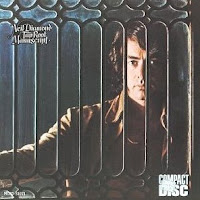
Here is an early music memory: I am very young. If not still a toddler, then not much older. I am running around the living room, squealing with unrestrained delight, while my dad chases me to the tune of "I Am the Lion" by Neil Diamond (Ba-pa-la ding-ga!). He's reached deep down and pulled out his big baritone voice—the one he also used for "Old Man River" on occasion; the one that always awed me. It's the early 1970s, and although hopelessly pop and showy, there is no shame in liking Neil Diamond. Not at this time. Later, I'd go through nearly two decades of keeping this (admittedly) often schmaltzy artist at more than arm's length. When I bothered to remember Neil Diamond, which generally I didn't, I thought of him more like a skeleton in my musical closet; a dirty little secret that, if exposed, would set me up for some heavy razzing from friends. I don't remember when it was that I recovered my dad's Tap Root Manuscript album. It was some time ago, since I still had my turntable and a couple crates of vinyl. I think I turned a boyfriend on to the album, and then (like the boyfriend) the album was banished from my life once more—for no other reason than I was switching to CDs, and (unlike the boyfriend) TRM was not something I wanted to replace. But I have to say, no matter what you think of "Sweet Caroline" or "Brother Love's Traveling Salvation Show" (and, god, please don't even talk to me about "You Don't Bring Me Flowers"!), the Neil Diamond of Tap Root Manuscript was truly amazing. Considering that the album came out in 1970, a year after I was born, it was adventurous and experimental for music at that time. It plunged into Africa, and it was more unapologetically Christian—exposing the deep religious missionary traditions on that continent—than collaborations to come in later years (think of Paul Simon's Graceland, another great album). Digging around a bit, I found the following reproduction of a note from Diamond that appeared in the original TRM album packaging: "When rhythm and blues lost its sensuality for me I fell in love with a woman named gospel. We met secretly in the churches of Harlem, and made love at revival meetings in Mississippi. And loving her as I did, I found a great yearning to know of her roots. And I found them. And they were in Africa. And they left me breathless. The African Trilogy is an attempt to convey my passion for the folk music of that black continent." For me, Tap Root Manuscript provides another passion: the passion of childhood abandon, the passion of laughter that I always associate with the album and the duets I would sing with my father when we turned up the volume on this collection of songs. My dad has replaced the old album with a CD, I know. I found it one time when I was visiting with my own toddler son. Unable to resist, I put the album on, and my son and I chased and laughed and sang in the living room to what I consider the three-song heart of the album: "Child Song," "I Am the Lion," and "Soolaimon" (at least, those were always my favorites). She callin'/Bring home my name/On the wings of a flea/Wind in the plains/Dance once for me. Soo, soo-lai-mon. Soolai, soolai, soolaimon.
Comments
What great and precious memories, thanks to Neil.
Not only couldn't relax but he couldn't relate
Now he can, family man, tried my plan....
That was the song we danced to (I think Bob Fosse did too). Thank you!
To "Anonymous," I think maybe you mistake me for someone else. Criticism is not a problem, but I have no "hipness creds" or "cool kids club" card, and you seem to lump me along with Diamond's "harshest critics." Actually, I didn't really say what I thought of "Brother Love's Traveling Salvation Show" or "Sweet Caroline," though it's true that my selection of them in contrast does point to the fact that I don't like them nearly as much as anything on the TRM album. I did come down hard on "You Don't Bring Me Flowers," which was also wildly successful, and (IMHO) quite saccharine. When we're young, we are all influenced by what our friends are listening to; hopefully, and I can say this is true in my case, that wears off—at least in terms of feeling that you need to make impressions or excuses. We are all entitled to our opinions, and I'm glad you shared yours. The fact that critics like a song, though, or that another becomes a "national anthem" of sorts, does not mean that I need to like them—or that if I don't, it's necessarily "strange." That's actually the kind of assumption usually made by those who do try to keep the "cool club" memberships under their control. Their logic goes like this: think like everyone else, and you too can be acceptable.
Amen.
It's true that this is what the creative journey is all about—for musicians and other artists, yes, but also for all of us on our life journeys. And it's quite a gift when people are willing to share their visions with us, whether or not we share them.
Thanks for posting.
Post a Comment